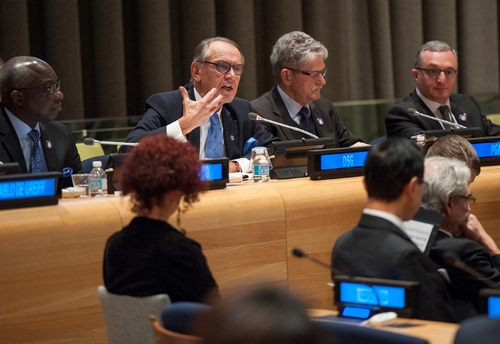“Those who do not learn from history are condemned to repeat it”: The Ambassador of Armenia

On 9 December 2015, the Permanent Mission of Armenia to the United Nations, in partnership with the President of the UN General Assembly and the UN Office on Genocide Prevention and the Responsibility to Protect, co-hosted the first annual observance of the International Day of Commemoration and Dignity of the Victims of the Crime of Genocide and of the Prevention of This Crime at the Trusteeship Council Chamber of the United Nations Headquarters.
Attended by a large number of representatives of UN member states and observers, international organizations, think-tanks, civil society organizations and media, as well as members of Armenian-American community and school students, the meeting in observance of the International Day began with a minute of silence in remembrance of the victims of genocide. Opening remarks were delivered by the President of the 70th Session of the UN General Assembly Mr. Mogens Lykketoft, the Deputy Secretary-General of the UN Mr. Jan Eliasson and the Ambassador and Permanent Representative of Armenia to the UN Mr. Zohrab Mnatsakanyan. The panel featured the UN Special Adviser on the Prevention of Genocide Mr. Adama Dieng, the Special Rapporteur on the promotion of truth, justice, reparation and guarantees of non-recurrence Mr. Pablo de Greiff, President of the International Center for Transitional Justice Mr. David Tolbert and First Vice President of the International Association of Genocide Scholars, Assistant Professor of Holocaust and Genocide Studies at Stockton University Prof. Elisa von-Joeden-Forgey. Statements on behalf of the UN member states were delivered by Chairpersons of regional groups.
In his remarks, Ambassador Zohrab Mnatsakanyan noted that the International Day, established pursuant to the UNGA Resolution 69/323 of September 11, 2015, calls for a manifestation of a collective sense of a duty before all victims of the crime of genocide. He reconfirmed Armenia’s commitment to promote and support international efforts to underpin the significance of the 1948 Convention on the Prevention and Punishment of the Crime of Genocide and to consistently and resolutely construct rigid foundations for prevention. In this regard, the Ambassador of Armenia recalled the unanimous adoption of the respective resolutions initiated by Armenia and adopted by the General Assembly and the Human Rights Council earlier this year, expressing appreciation to all the partners for their unwavering support. He recalled that in April 2015 Armenia hosted a Global Forum Against the Crime of Genocide.
Referring to the remarks by the President of the General Assembly and the Deputy Secretary General, who said, earlier, that, by honoring the memory of the victims of the Genocide, the international community reaffirmed its commitment to prevent this horrendous crime, Zohrab Mnatsakanyan noted that the International Day would render dignity to the victims of past inaction and would help reclaim justice. Mr. Mnatsakanyan further remarked that 9 December would not merely mark the adoption of a landmark international legal instrument, but also send a powerful message to ignite political, legal and moral responsibility “for defying and ultimately halting the repetitive nature of this crime”, as a “moral and political imperative” to consistently elaborate a rigid system of prevention.
“Those who do not learn from history are condemned to repeat it”, stressed the Ambassador of Armenia, suggesting that, to eliminate genocidal tendencies, it will be imperative to analyze the causation of past cases, and that “every pattern of discrimination, every violation of rights affecting vulnerable groups, every exclusionary ideology, climate of impunity, denial of genocide and hate speech, as well as incitement to violence” are exactly compelling early signs, which beg early action.
The panelists elaborated on the nature, causes, and consequences of genocide, empirical analysis of genocidal patterns, and their relationship to long-term prevention, the importance of memorialization and dignity of genocide victims, their right to remedies and reparations, guarantees of non-recurrence and accountability, the links between genocide and other human rights violations, and prevention and punishment of genocide.
The UN Secretary-General issued a message on the first observance of this International Day, calling upon the international community “to recognize the need to work more concertedly to protect individuals from gross human rights violations and uphold our common humanity”.




 Արևելահայերեն
Արևելահայերեն Արևմտահայերեն
Արևմտահայերեն Русский
Русский






